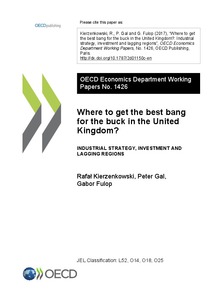Where to get the best bang for the buck in the United Kingdom? Industrial strategy, investment and lagging regions
"The United Kingdom is preparing a modern industrial strategy to boost labour productivity across the whole country and to narrow regional gaps in living standards. This raises the question of the optimal allocation of scarce resources in meeting these targets. This study identifies industrial...
| Main Authors: | , , |
|---|---|
| Institution: | ETUI-European Trade Union Institute |
| Format: | TEXT |
| Language: | English |
| Published: |
Paris
2017
OECD |
| Subjects: | |
| Online Access: | https://www.labourline.org/KENTIKA-19396908124911141809-Where-to-get-the-best-bang-for.htm |
| Summary: | "The United Kingdom is preparing a modern industrial strategy to boost labour productivity across the whole country and to narrow regional gaps in living standards. This raises the question of the optimal allocation of scarce resources in meeting these targets. This study identifies industrial strengths of each region and scope to boost regional productivity through the channel of higher capital intensity. Overall regional investment ratios appear weakly linked to regional productivity, but the sectoral composition of regions and their type of investment are more important determinants. Each region has productivity leaders, but the concentration of such firms is the highest in the south of England. Differences in the representation of the most productive firms in regions are strongly related to differences in regional productivity. The empirical methodology quantifies the productivity effects of raising the capital intensity in each sector-region, focusing on viable firms falling behind the national productivity frontier in all but the finance and insurance sectors over 1995-2014. To enhance labour productivity of lagging regions, the industrial strategy should promote the catch up of firms with the national best performers in services sectors, in particular knowledge intensive services such as ICT and business services, but also wholesale and retail trade. This finding is consistent with the UK’s leading global position in high value-added services sectors. The type of investment matters: boosting research and development in the manufacturing sector in some lagging regions would also be effective in stimulating productivity. Manufacturing investment cannot be a substitute to investment in services given the small size of the manufacturing sector and its high exposure to competition from rapidly emerging global hubs. However, this study does not quantify the effects of skills, the benefits of greater industrial diversification and the positive impact that larger cities would have on agglomeration effects." |
|---|---|
| Physical Description: | 24 p. Digital |

